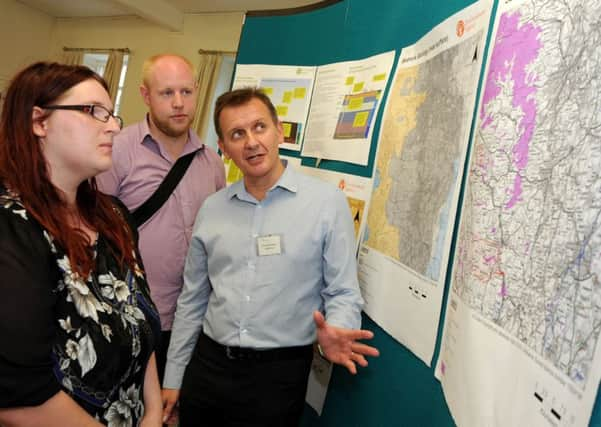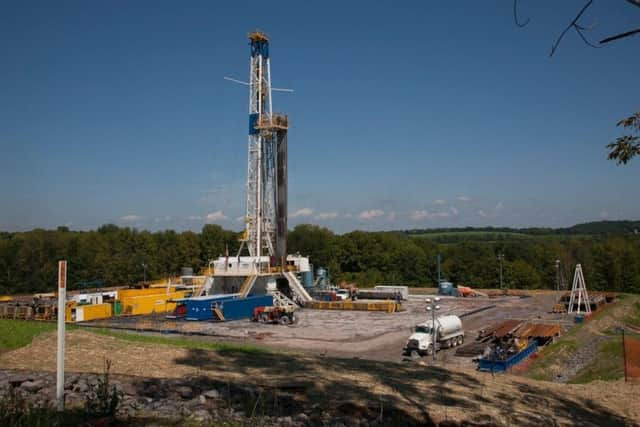Derbyshire residents quiz experts over fracking controversy


Fracking is a process which involves gas being released from the ground by fracturing the rocks beneath our feet - and North East Derbyshire looks set to be one of the first parts of the country that will see it.
As a result, the Government agencies responsible for regulating the fledgling industry organised a drop-in session at the Peel Centre in Dronfield last Thursday where residents were given the opportunity to speak to experts.
Advertisement
Hide AdAdvertisement
Hide AdRepresentatives from the Environment Agency, the Oil and Gas Authority, Public Health England and the Health and Safety Executive were all in attendance to answer questions from a mostly sceptical public.


One of them, Peter Stevenson from the Environment Agency, said: “On the matter of whether fracking is good or bad we are neutral - it is our responsibility to consider when somebody applies for a permit whether it is safe for them to carry out that activity in that place.
“A company would need two main permissions if they wanted to carry out fracking in this area. One would be planning permission from North East Derbyshire as the planning authority and they would need a permit for the activity itself from the Environment Agency.
“Until we get an application for either of those two permissions we don’t have any detail as to what companies want to do or precisely where they want to do it in this area.
Advertisement
Hide AdAdvertisement
Hide Ad“In theory we could receive an application tomorrow but it could still be months or years before anything happens and at this stage any drilling is likely to be only a short term operation to find out if there is actually any gas down there worth getting.”


Mr Stevenson admitted that increased seismic activity - earthquakes - were a hot topic of conversation among those in attendance and that this risk would have to be ‘managed’ by authorities.
One of those at the drop-in session was Harry Barnes, who was the member of parliament for North East Derbyshire between 1987 and 2005.
Mr Barnes - who is now 80 - is worried fracking might not be safe in the area because of the region’s coal mining history and believes buildings like Chesterfield’s iconic Crooked Spire could even be at risk.
Advertisement
Hide AdAdvertisement
Hide AdHe said: “I want to know why North East Derbyshire looks like it is going to be the first place that gets it how much impact our coal mining history could have on it.
“Anywhere that they find in a rural area is only going to be at the most a mile or so away from the town and once they get under the town there could be many dangers.
“We have to be very careful about what is happening and the more information that we can get, the better.”
As well as Mr Barnes, others there were worried about the potential environmental impacts on the drilling - both below the ground and above it.
Advertisement
Hide AdAdvertisement
Hide AdAndy Tickle from Friends of the Peak District, said: “We have two main concerns - the first is the physical impact on the communities and tranquillity of the countryside and the environmental impact on water and so on.
“The second is because we are clear that climate change is the most important threat to the countryside we really don’t believe that exploiting shale gas is going to allow us to reduce emissions to the kind of levels we need to.
“We will look at every case on its merits but to us it doesn’t like a very good thing at all.”
The drop-in session ran from 2-7pm and earlier in the day there was a steady stream of people eager to listen to what the agencies had to say.
Advertisement
Hide AdAdvertisement
Hide AdOne of them, Peter Gray from Coal Aston, said: “I am open minded about fracking and I think today has been useful because we aren’t talking to an oil company, we are talking to the people who will regulate the industry.
“What is being explained to us is the detail of how the planning applications would work as and when they are submitted.
“I think I’m less opposed than some others because the industry would create jobs and address the continuing energy needs of our country.
“I also think a lot of what we are being told by opponents of fracking is claptrap and I choose to be open minded rather than believe everything I read on the internet.”